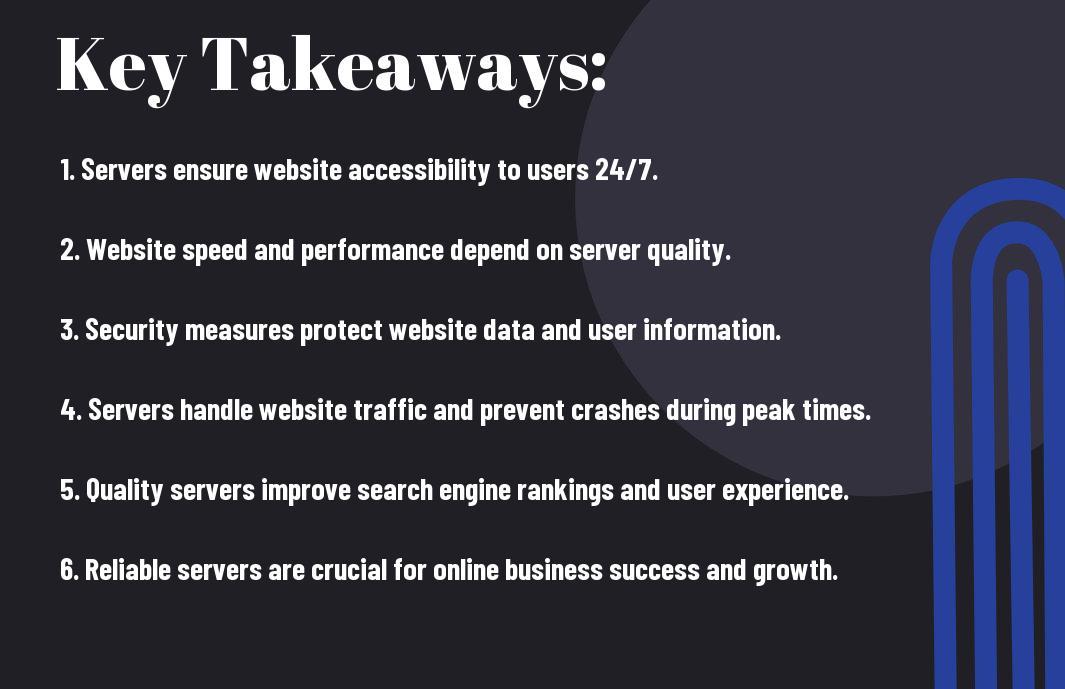Undoubtedly, one of the most critical components of your online business is the server hosting your website. Your website server plays a crucial role in ensuring that your website is accessible, secure, and efficient for your visitors. Choosing the right server is essential to ensuring that your online business runs smoothly and maximizing your website’s performance. In addition, a reliable server is crucial for protecting your website against cyber threats such as hacking and malware, which could potentially harm your business and reputation. With a properly maintained server, you can also expect faster loading times, ensuring that your visitors have a positive experience on your website.
Key Takeaways:
- Website Performance: Website servers play a crucial role in determining the performance and speed of an online business’s website. A reliable server ensures smooth loading times and seamless user experience, which can lead to higher customer satisfaction and retention.
- Security and Reliability: Website servers are essential for maintaining the security and reliability of an online business’s website. A secure server helps protect sensitive customer data and prevents cybersecurity threats, while a reliable server ensures minimal downtime and uninterrupted service for customers.
- Scalability and Flexibility: Choosing the right website server allows online businesses to easily scale their operations and adapt to changing demand. A flexible server infrastructure enables businesses to expand their website capabilities and accommodate increased traffic without compromising on performance or security.

Website Servers Explained
If you are running an online business, you must have come across the term “website servers”. But do you really know what they are and why they are so important for your online presence? In this chapter, we will delve into the intricacies of website servers and why they are a crucial aspect of running a successful online business.
Definition and Types of Website Servers
If you are new to the world of website servers, understanding the definition and different types is essential. A website server is a computer that is used to store, process, and deliver web pages to users. There are various types of website servers, including shared servers, virtual private servers (VPS), dedicated servers, and cloud servers. Each type has its own set of advantages and disadvantages, so it’s important to carefully consider your business needs before making a decision. The table below provides a quick comparison of the main features of each type of server.
| Type of Server | Main Features |
|---|---|
| Shared Server | Low cost, limited resources, shared with other websites |
| Virtual Private Server (VPS) | Mid-range cost, dedicated resources, virtual partitioning |
| Dedicated Server | High cost, full control, dedicated resources |
| Cloud Server | Flexible cost, scalable resources, cloud-based infrastructure |
The type of server you choose will depend on factors such as the size of your business, the amount of traffic your website receives, and your budget. It’s important to weigh the pros and cons of each type before making a decision. The type of server you choose will significantly impact the performance and security of your website.
How Website Servers Work
Now that you have a basic understanding of the different types of website servers, let’s take a closer look at how they actually work. When a user enters your website’s URL into their web browser, their computer sends a request to your website server. The server then processes this request and delivers the web page back to the user’s browser, allowing them to view your website. This entire process happens in a matter of seconds, thanks to the high-speed internet connections and powerful hardware that website servers are equipped with.

Impact of Website Server Performance
Not only is a website server crucial for the functionality of your online business, but the performance of your server can have a significant impact on the success of your website. If your website server is not performing at its best, it can lead to slow loading times, unresponsiveness, and even downtime, all of which can negatively affect the user experience and your bottom line. To learn more about the benefits of web hosting for online businesses, check out HOW ONLINE BUSINESS CAN GET BENEFIT FROM WEB HOSTING.
Server Speed and User Experience
One of the most critical aspects of website server performance is the speed at which your website loads. When a visitor lands on your site, they expect it to load quickly. If it takes too long, they may become frustrated and navigate away, leading to a high bounce rate. A fast server can improve user experience, keep visitors on your site longer, and potentially lead to higher conversion rates.
Reliability and Uptime Guarantees
Your website server’s reliability is essential for the success of your online business. Uptime guarantees are crucial because any downtime can result in lost revenue and a tarnished reputation. Customers expect your website to be available 24/7, and a reliable server with high uptime guarantees can ensure that your site is always accessible to your audience.
“
Server Security and Online Businesses
For online businesses, server security is of utmost importance. Your website servers are the backbone of your online presence, and any security breach can have devastating effects on your business. If you want to learn more about the importance of domain and web hosting for online businesses, check out Importance Of Domain & Web Hosting For Online Businesses.
Importance of Security Measures
When it comes to server security, implementing robust security measures is crucial for protecting your website and your customers’ data. This includes regular security updates and patches to fix vulnerabilities, strong encryption protocols for data transmission, and firewalls and intrusion detection systems to prevent unauthorized access to your server.
Handling Sensitive Data and E-commerce Transactions
As an online business, you are likely to handle sensitive customer information, especially if you are involved in e-commerce transactions. This includes personal and financial data that must be securely stored and transmitted. Implementing SSL certificates and PCI DSS compliance is essential to ensure the security of these transactions and build trust with your customers.
“
Choosing the Right Server for Your Business
Keep in mind that the server you choose for your online business plays a critical role in its performance and success. As discussed in a previous blog post on The Importance of Website For Your Business, a reliable server is essential for providing a seamless experience for your customers. Here are some key factors to consider when selecting a server for your business:
Factors to Consider When Selecting a Server
When it comes to choosing the right server for your business, there are several factors you need to consider. First and foremost, consider the performance and reliability of the server. You want to ensure that it can handle high volumes of traffic and provide a consistent experience for your users. Additionally, security is of utmost importance. You want to choose a server that offers robust security features to protect your website and customer data from cyber threats. Scalability is another essential factor to consider. As your business grows, you need a server that can easily accommodate increased demand. The support provided by the server provider should also be taken into account. Having reliable customer support can be invaluable when you encounter any issues with your server. The location of the server is also important, as it can impact the speed and performance of your website. The cost is, of course, a significant factor, but you should weigh it against the value and features that the server provides.
The Cost-Benefit Analysis of Server Options
When considering the cost-benefit analysis of server options, you must evaluate the upfront and ongoing costs of each server type. It is important to weigh the initial investment against the potential benefits and savings in the long run. While a dedicated server may come with a higher upfront cost, it may offer better performance, security, and scalability for your business. On the other hand, a shared server may be a more cost-effective option, but it may not provide the same level of performance and security. Ultimately, you need to assess your business needs and prioritize the features that are most important for your online presence.
The Importance of Website Servers for Online Businesses
Ultimately, website servers play a crucial role in the success of your online business. A reliable server ensures that your website is always accessible to your customers, leading to a positive user experience and increased customer satisfaction. Additionally, a powerful server can handle high traffic volumes, ensuring that your website can accommodate a large number of visitors without experiencing slow loading times or crashes. This is essential for maintaining a competitive edge in the online marketplace. Furthermore, a secure server protects your website and customer data from potential cyber threats, giving you and your customers peace of mind. In conclusion, investing in a high-quality website server is essential for the success and growth of your online business.
FAQ: The Importance of Website Servers for Online Businesses
Q: What is the role of website servers in an online business?
A: Website servers play a crucial role in hosting and delivering online content to users. They store, process, and deliver website data, ensuring that the website is accessible and functional for visitors.
Q: What are the benefits of using a dedicated server for an online business?
A: Using a dedicated server provides exclusive resources and greater control over server configurations, leading to improved performance, security, and scalability for the website. It also ensures consistent uptime and reliability.
Q: How does the location of the server impact website performance?
A: The location of the server can significantly impact website performance, especially for businesses targeting specific geographical locations. A server located closer to the target audience can reduce latency and improve website loading speeds.
Q: What security measures should be in place for website servers?
A: Implementing robust security measures such as firewalls, SSL certificates, intrusion detection systems, and regular security audits is essential to safeguard website data and protect against potential threats and cyber-attacks. Regular updates and patches are also crucial for maintaining server security.
Q: How can a business ensure the scalability of its website server as it grows?
A: To ensure scalability, businesses can opt for scalable hosting solutions such as cloud hosting or VPS (Virtual Private Server) hosting. These options allow for easy expansion of resources as the business grows, ensuring that the website can accommodate increasing traffic and data demands.
CATEGORY:Web Hosting

